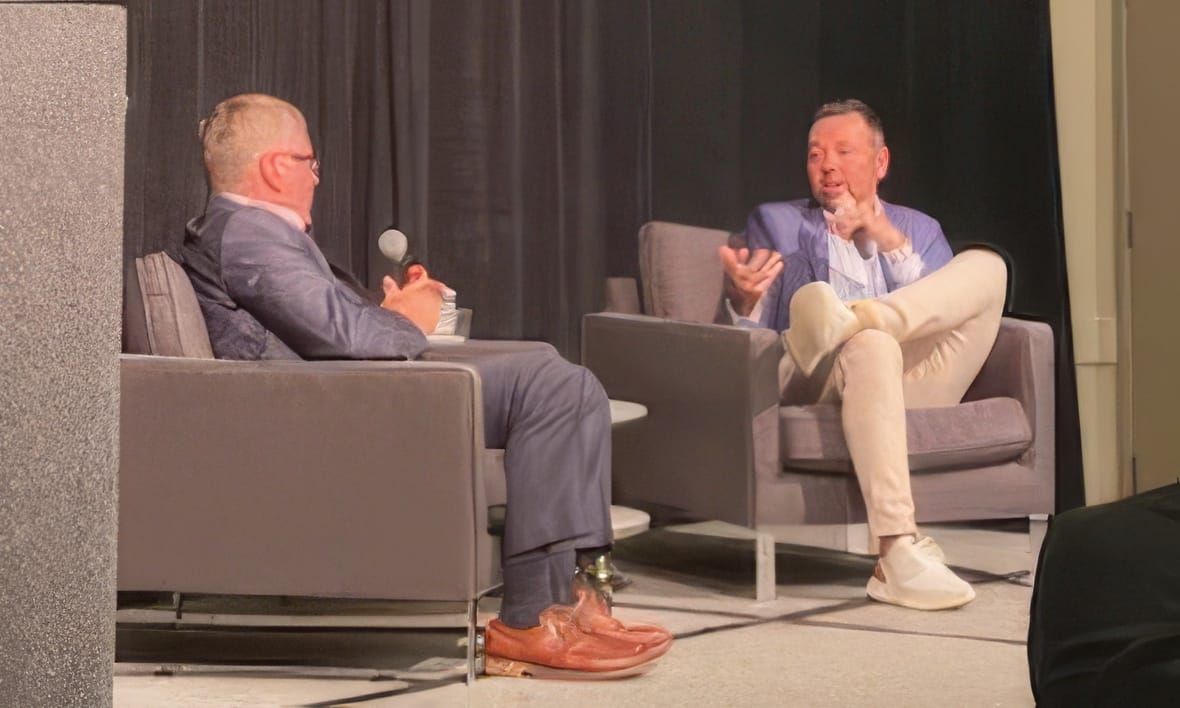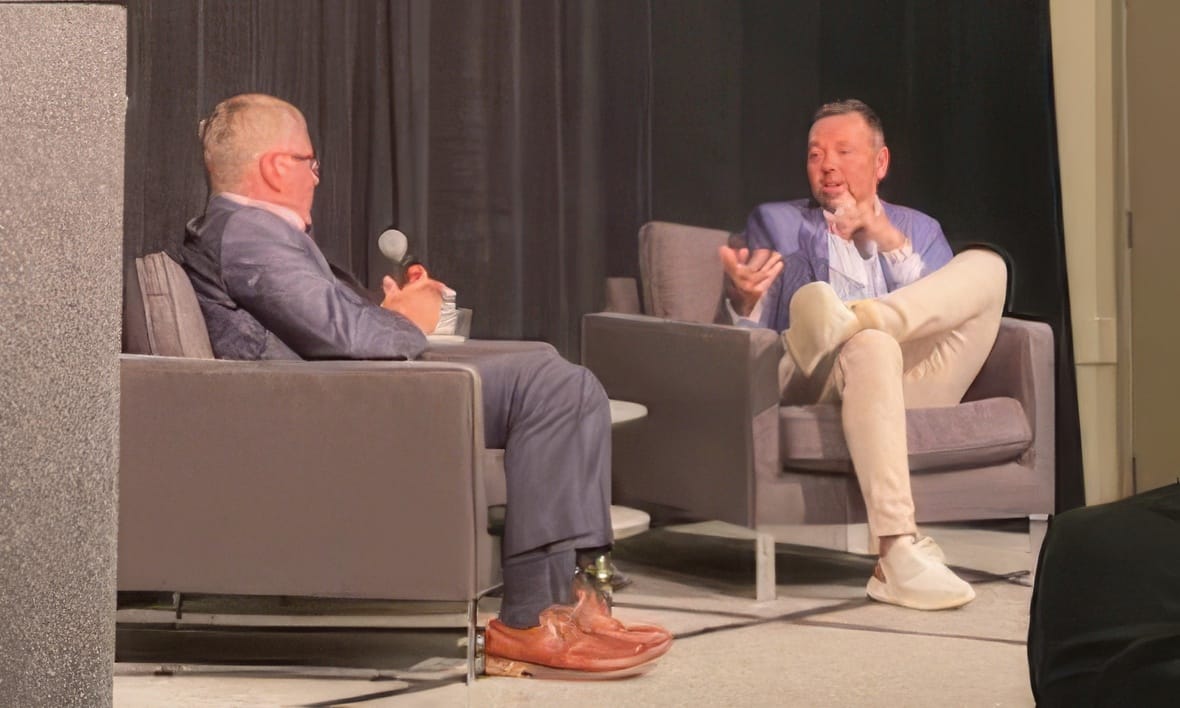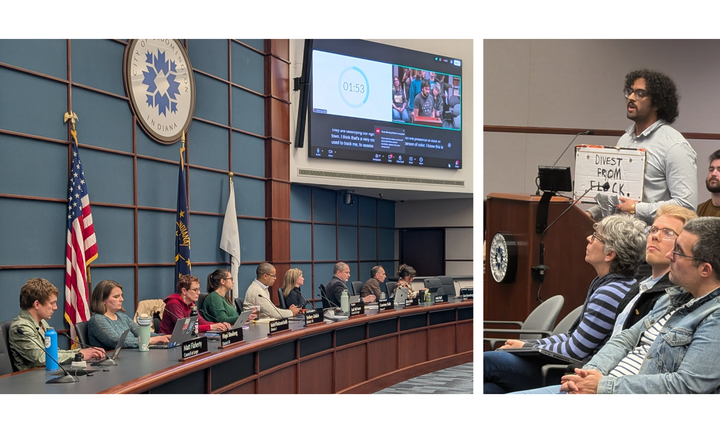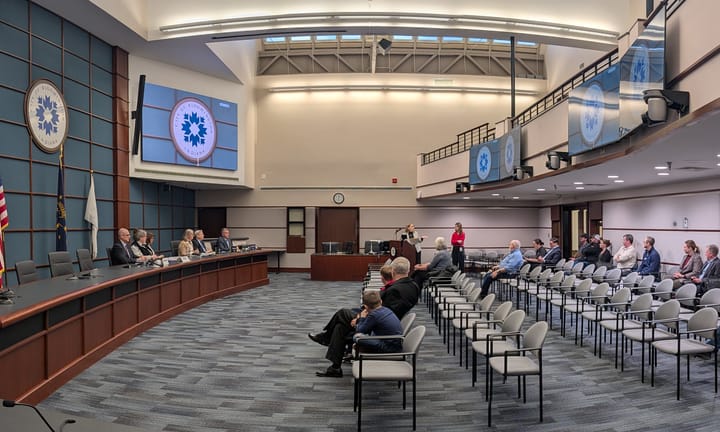At talk with Bloomington developers, Lt. Gov. Micah Beckwith pushes for overhauling property taxes—or abolishing them
Indiana Lt. Gov. Micah Beckwith said homes should be taxed based on purchase price, instead of assessed value, at a talk on Thursday. The talk was hosted by the Building Association of South Central Indiana, the Greater Bloomington Chamber of Commerce, and the Indiana Uplands Realtor Association.


Indiana Lieutenant Governor Micah Beckwith said he thinks homes should be taxed based on their purchase price, rather than their assessed value, at a talk before real estate agents and developers in Bloomington on Thursday.
The talk was hosted by the Building Association of South Central Indiana, the Greater Bloomington Chamber of Commerce, and the Indiana Uplands Realtor Association. Around 70 people gathered in the Monroe Convention Center to listen to his remarks, which were moderated by Rick Wajda, the CEO and chief lobbyist of the Indiana Builders Association. The facility was recently renamed the Bloomington Convention Center, but is still known predominantly by its original moniker.
Though Beckwith—a self-described Christian nationalist—has a history of inflammatory statements on social issues, his conversation with Wajda remained squarely focused on housing and development policy. And the audience was largely receptive, with neither quiet protests nor the kind of loud disruptions that led to two arrests at a town hall in Newburgh hosted by Beckwith on Wednesday.
Repeating arguments he has made online for months, Beckwith said it would be fairer to tax homes based on how much their owners bought them for—instead of estimating their value based on appraisal and adjustment techniques that consider age, condition, and the market value of recently sold properties nearby.
“It’s a lot of people just saying, ‘we think your house is worth this much,’” he said.
Beckwith, who has referred to property taxes as “immoral,” also endorsed a proposal by State Rep. J.D. Prescott (R-Union City) to “repeal and replace” them with a 7% sales tax on services.
Property taxes—which rose sharply for many Indiana residents as the assessed value of their homes increased—were a major campaign issue for Governor Mike Braun, who pushed for legislation that would cap property tax increases but signed a pared-back version of the changes into law in April. Beckwith maintained his hard line, saying the legislation—Senate Enrolled Act 1—had been watered down and urged Braun to veto it.
On Thursday, Beckwith doubled down on his opposition to SEA 1, which provided major property tax breaks for businesses and extended an up-to-$300 homestead tax credit to homeowners.
“The Senate stripped the governor’s language out of the bill, put in their own language that wasn’t very good, and then they passed it. And then about a week later, everyone got their property tax assessments in their mail,” said Beckwith, who had publicly urged Braun to veto the bill. “And I’ll tell you what, heads were exploding.”
But Beckwith said he didn’t blame Braun for his decision to let SEA 1 move forward.
“I don’t think it was the governor’s fault,” he said. “ I think it was the legislature. The legislature gave the governor a bad bill.”
SEA 1 has also drawn criticism from local leaders who fear it will force counties to make painful budget cuts—and Beckwith acknowledged the strain when Wajda asked him about encouraging counties to hire stormwater coordinators.
“That would be a hard sell at this juncture, with what is going on with [SEA 1], and how these local communities are trimming every which way,” Beckwith said. “Nobody’s thinking about adding anything right now.”
Wajda said he hopes to work with state leaders to cut red tape, citing an industry group’s calculation that government regulation accounts for roughly 24% of the price of a new single-family home. Beckwith said he was on board with deregulation, but drew the line at compelling municipalities to speed up permitting processes or loosen zoning rules.
“We’re 92 sovereign counties that link arms and walk in the same direction,” he said. “And the last thing I want to do is for Indianapolis to come in and take away your sovereignty.”
Tax shakeups would face uphill battle
Beckwith argued at Thursday’s talk that taxing homes based on their purchase price would encourage homeowners to stay in one place, putting down roots and building wealth as the market value of their property rises.
“To take a house you bought for $200,000, and three years later, they say it’s worth $400,000—I don’t think that’s fair,” said Jason Bell, BASCI’s executive director, after the talk on Thursday.
But economists say that a property tax system like Beckwith’s proposal could make Indiana a lot more like California—a state that Beckwith heavily criticized during the Thursday talk.
Indiana University professor Justin Ross, a public finance economist who studies state and local tax policy, said that California’s Proposition 13 is the most prominent example of a tax system like Beckwith’s proposal. The proposition limits increases in the taxable value of a house to 2% each year—meaning longtime homeowners face lighter taxes.
Because Proposition 13 is effectively a tax on people who decide to move, older people are less likely to downsize, and housing stock doesn’t free up for younger families, according to Ross. Lower geographic mobility can also create a mismatch where the regions with job opportunities don’t have available housing. And because building housing is no longer an effective way to raise tax revenue, local governments may be less likely to zone for residential construction.
“If you think of California being everybody’s poster child for its poorly functioning housing market, they always point to this law,” Ross said.
A purchase price-based property tax could also run into legal obstacles. Ball State University economist Michael J. Hicks said that it would likely violate the equal protection clause of the U.S. Constitution, which courts have sometimes applied when jurisdictions inconsistently assess property value.
According to Hicks, Beckwith’s proposal could also require an amendment to the Indiana constitution, which mandates “a uniform and equal rate of property assessment and taxation.”
“The good news is, just a few days of thinking about this, or minutes thinking about this, would prevent it from being enacted,” Hicks said.
A so-called “tax swap” that replaces property taxes with sales taxes could also face major hurdles. To make up for lost property tax revenue, the sales tax rate might have to rise to 12 to 14%, Hicks estimated. And because taxpayers often spend a greater percentage of their income on consumption, sales taxes are generally regressive—more so than property taxes, according to Hicks.
A tax swap would also have major implications for local governments, which would lose much of their ability to generate revenue. Property taxes in Indiana are collected by local taxing units—like counties, school districts, and libraries—and pay for local services. But sales taxes are collected and distributed by the state, so replacing property taxes would likely tighten the statehouse’s grip on government purse strings.
“We’d just basically have to get rid of local governments entirely,” Ross said.
A dangerous game?
Two ruptured Achilles tendons, a broken nose, a dislocated finger, and a tweaked hamstring—those were the casualties of the annual Legislative Basketball Game in March played at Gainbridge Fieldhouse, according to Beckwith.
Beckwith himself limped away from the game with a damaged Achilles tendon, leaving him in a boot for months—a memory that Wajda teased him about on Thursday.
“You’ve got regular shoes back on, you’re moving around,” Wajda said.
“I ran for the first time the other day,” Beckwith replied. “I feel like I’m getting so old, because I have to do the elliptical now.”
He is preparing for a hip replacement surgery in October, Beckwith said, and is looking forward to dunking basketballs in his new “bionic” body.




Comments ()